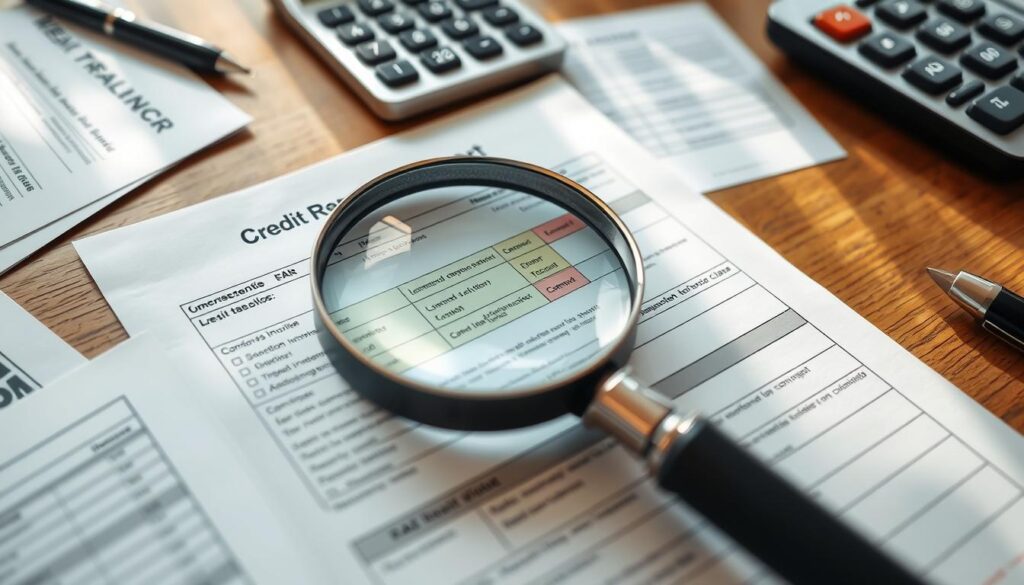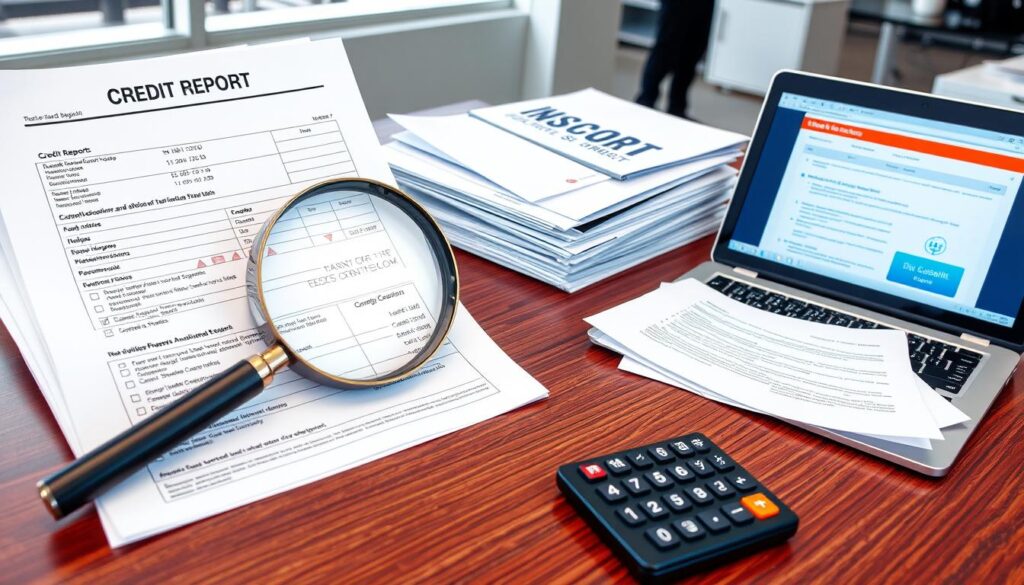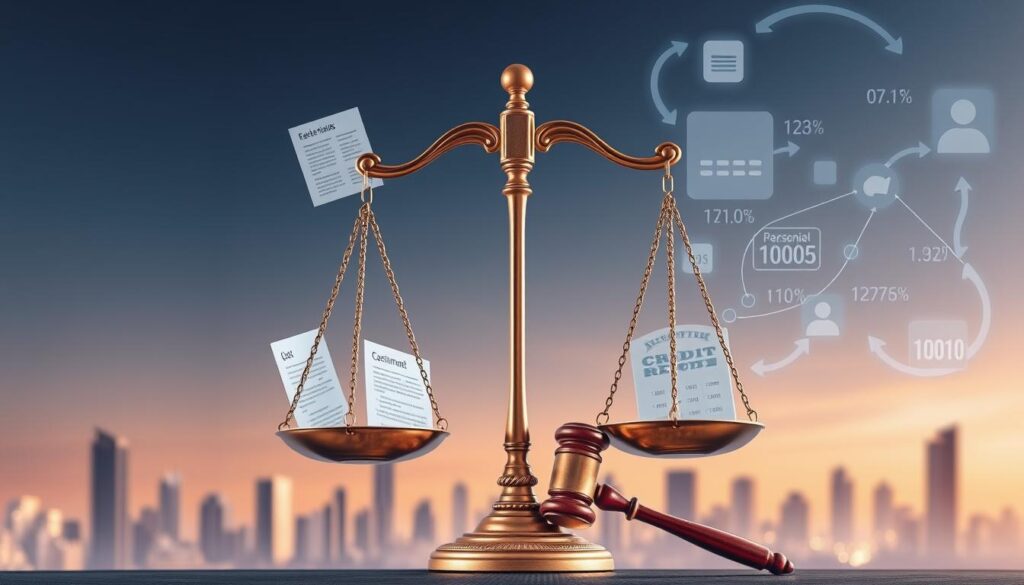A correct credit report is vital for your money health. Sadly, errors in credit reports happen more often than you’d expect. These issues can hurt your credit score and money chances.
Wrong account info or mixed-up identities can cause big problems. This guide will show you how to fight errors on your credit report. You’ll learn to protect your money future.
Key Takeaways
- Understand the common types of credit report errors and inaccuracies
- Learn how to identify and document credit report discrepancies
- Discover the process for drafting and submitting a well-crafted dispute letter
- Familiarize yourself with your rights under the Fair Credit Reporting Act
- Explore strategies for following up on your dispute and ensuring a successful resolution
Understanding Credit Report Errors
Your credit report is vital for your financial life. It affects your ability to get loans, credit cards, and jobs. Errors can appear in these reports for various reasons, including data entry mistakes and identity theft.
These mistakes can greatly impact your financial opportunities. They can lower your credit score and make it harder to get credit. Some employers even use credit checks when hiring.
Common Credit Report Inaccuracies
Some of the most common credit report inaccuracies include:
- Incorrect personal information, such as name, address, or date of birth
- Accounts that do not belong to you, often the result of identity theft
- Incorrect account balances, payment histories, or credit limits
- Duplicate accounts or accounts that have been closed but still appear as open
- Errors in the reporting of payments, such as late payments that were actually on time
Impact of Credit Report Errors
The impact of credit report errors can be substantial. They can make it harder to get credit or rent an apartment. In severe cases, these mistakes might even cost you a job opportunity.
“Credit report errors can have a significant and long-lasting impact on your financial well-being. It’s essential to regularly review your credit report and address any discrepancies promptly.”
Fixing credit report mistakes is key to a healthy credit profile. It ensures you have access to the financial opportunities you deserve. Regular checks and prompt action can protect your financial future.
The Importance of Credit Report Accuracy
Accurate credit reports are vital for your financial health. They show your creditworthiness and affect lending decisions. Understanding this importance helps you control your financial future.
Accurate credit reports matter for several key reasons:
- Credit Score Impact – Inaccuracies can hurt your credit score. This makes it harder to get good loans, credit cards, and even jobs.
- Lending Decisions – Lenders use your credit report to judge your creditworthiness. Wrong info can lead to unfair lending choices.
- Financial Health – Errors in your report may signal identity theft or other issues. These problems can cause serious trouble if ignored.
- Credit Management – Keeping your report accurate helps you manage credit better. You can spot areas to improve and make smarter money choices.
Checking your credit report’s accuracy is crucial for good finances. It helps protect your credit and secure your financial future.
By staying alert, you can avoid problems and build a stronger financial foundation.
“Accurate credit reports are the foundation of a healthy financial life. Neglecting to monitor and address inaccuracies can have far-reaching consequences.”

| Importance of Credit Report Accuracy | Impact |
|---|---|
| Credit Score | Inaccuracies can negatively impact your credit score, making it harder to secure favorable terms for loans and credit cards. |
| Lending Decisions | Lenders rely heavily on credit reports to assess creditworthiness, leading to unfair lending decisions if the information is inaccurate. |
| Financial Health | Errors or discrepancies in your credit report can be indicative of identity theft or other financial issues, requiring prompt attention. |
| Credit Management | Monitoring credit report accuracy allows you to identify areas for improvement and make informed financial decisions. |
When to Dispute Credit Report Errors
Accurate credit reports are vital for building a strong financial foundation. Errors can occur, despite credit bureaus’ efforts. Knowing when to dispute can protect your financial well-being.
Signs of Credit Report Discrepancies
Spotting credit report inaccuracies is crucial for addressing issues. Look out for these common red flags:
- Incorrect personal information, such as your name, address, or date of birth
- Accounts that do not belong to you, indicating potential identity theft
- Inaccurate payment histories, including missed or late payments that never occurred
- Outdated or incomplete information about your credit history
If you spot these issues on your credit report, act fast. Dispute the errors right away. This helps keep your financial information accurate.
| Type of Credit Report Error | Potential Impact |
|---|---|
| Incorrect Personal Information | Can lead to identity theft and difficulty obtaining credit or loans |
| Accounts Not Belonging to You | Can negatively impact your credit score and make it harder to qualify for new credit |
| Inaccurate Payment Histories | Can lower your credit score and make it more challenging to secure favorable interest rates |
Stay alert and check your credit report often. This helps you catch and fix any issues quickly. Your credit history should reflect your true financial responsibility.
Preparing for the Credit Report Dispute Process
Fixing errors on your credit report is vital for a healthy financial profile. Gather all necessary documents to support your case. This prep work will boost your chances of success.
Strong documentation is key to winning your dispute. It proves your point and helps resolve issues faster.
Gathering Necessary Documentation
To build a strong case, collect these items:
- Copies of your most recent credit reports from the three major credit bureaus: Experian, Equifax, and TransUnion.
- Detailed payment records, account statements, and any correspondence with creditors related to the disputed items.
- Copies of any documents that demonstrate the inaccuracy of the information on your credit report, such as receipts, invoices, or proof of identity theft.
Thorough documentation helps credit bureaus investigate disputed items effectively. It provides evidence to correct any credit report inaccuracies.
This approach to the credit report dispute process protects your consumer rights. It ensures accurate credit report investigations.
| Documentation Required | Purpose |
|---|---|
| Copies of credit reports | Identify the specific items to be disputed |
| Payment records and account statements | Provide evidence of accurate information |
| Correspondence with creditors | Demonstrate communication and resolution attempts |
| Proof of identity theft or inaccuracies | Support the basis for the dispute |
Well-prepared dispute documentation sets you up for success. It helps address credit report errors and keeps your financial records accurate.

Writing an Effective Dispute Letter
A well-crafted dispute letter is vital for fixing credit report errors. By using the right approach, you can boost your chances of success. This process helps resolve any credit report inaccuracies you’ve found.
Key Elements of a Dispute Letter
Your credit report dispute letter should include these important parts:
- Identification of Specific Errors: Clearly point out each credit report inaccuracy you’ve discovered. Give details about every error.
- Supporting Evidence: Collect proof that backs up your claims. This can include payment receipts, account statements, or creditor emails.
- Request for Investigation: Ask the credit bureau to look into the disputed items. They should provide a solution.
- Consumer Rights: Mention your rights under the Fair Credit Reporting Act. This law ensures accurate credit reporting and timely dispute investigations.
- Contact Information: Add your full name, address, phone number, and account numbers. This helps with the investigation and response.
These guidelines will help you write a strong dispute letter. Your letter will clearly state your concerns about credit report inaccuracies.
A well-written letter increases your chances of fixing errors. This can lead to a more accurate credit report.
| Key Element | Description |
|---|---|
| Identification of Specific Errors | Clearly identify the specific credit report inaccuracies you have found, providing details on each error. |
| Supporting Evidence | Gather any documentation or evidence that supports your claim of the errors, such as payment receipts, account statements, or correspondence with creditors. |
| Request for Investigation | Formally request that the credit bureau investigate the disputed items and provide a resolution. |
| Consumer Rights | Cite your rights under the Fair Credit Reporting Act, which entitles you to accurate credit reporting and a timely investigation of any disputes. |
| Contact Information | Include your full name, address, phone number, and account numbers to facilitate the investigation and response. |
Sending the Dispute Letter
After crafting your credit report dispute letter, it’s time to send it to the credit bureaus. This step kicks off the credit report investigation process. It’s crucial for fixing errors on your credit report.
You can send your dispute letter in several ways. Choose the method that works best for you.
- Submitting the letter via the credit bureau’s online dispute portal
- Mailing the letter through certified or registered mail
- Faxing the letter directly to the credit bureau’s dispute department
Make sure to track your submission and keep detailed records. This helps you monitor progress and ensures timely responses. Good record-keeping is key to successful credit bureau communication.
| Submission Method | Advantages | Disadvantages |
|---|---|---|
| Online Dispute Portal | Faster processing, electronic documentation | Limited to specific credit bureau’s platform |
| Certified Mail | Delivery confirmation, paper trail | Slower turnaround, higher cost |
| Fax | Immediate transmission, electronic documentation | Reliability concerns, limited record-keeping |
After your credit report dispute submission, the credit bureaus will start their investigation. This can take up to 30 days. Stay alert and respond quickly to any messages from them.
Following Up on Your Dispute
Staying engaged in the credit report dispute process is vital. Credit bureaus must investigate your dispute within a set timeline. Understanding this process helps ensure a timely and favorable resolution.
Timeline for Credit Bureau Responses
Credit bureaus have 30 days to investigate your dispute and respond in writing. They’ll confirm the information’s accuracy or note any changes made. Keep a close eye on your dispute’s status.
If you don’t hear back in 30 days, you can request a reinvestigation. This may require additional documentation or communication with the credit bureau.
| Step | Timeline |
|---|---|
| Credit bureau receives your dispute | Day 1 |
| Credit bureau investigates the dispute | Within 30 days |
| Credit bureau provides a written response | Within 30 days |
| Opportunity to request a reinvestigation | If the credit bureau fails to respond within 30 days or if you disagree with their findings |
Know the credit bureau response timeline and actively follow up on your dispute. This helps protect your consumer rights and ensures quick resolution of credit report inaccuracies.
The Fair Credit Reporting Act and Your Rights
The Fair Credit Reporting Act (FCRA) protects your rights as a consumer. This federal law ensures your credit report is accurate and fair. It’s important to know how it affects you.
The FCRA lets you dispute errors in your credit report. Credit bureaus must investigate your claims and fix any real mistakes. They have to do this within a reasonable time.
The law also sets rules for credit bureaus. They must give you a free yearly credit report. They can’t include outdated accounts or wrong court judgments in your report.
Knowing your FCRA rights helps you during credit disputes. You can challenge errors more effectively. This ensures your credit report stays accurate and trustworthy.
“The Fair Credit Reporting Act is a vital tool in protecting consumers from unfair or inaccurate credit reporting practices. Understanding your rights under this law is essential in maintaining a healthy credit profile.”
The FCRA gives you power over your credit report. Use these protections to guard your financial health. Stay informed about your credit report to handle credit reporting issues better.

Handling Rejected Disputes
Rejected credit report disputes can be frustrating, but don’t lose hope. You have ways to address the issue and ensure credit report accuracy. The Fair Credit Reporting Act (FCRA) provides protections for correcting inaccurate information.
If your dispute is rejected, consider these steps:
- Request a detailed explanation from the credit bureau(s) regarding the reasons for the rejection. This will help you identify the specific issues you need to address.
- Gather additional evidence or documentation to support your claim of inaccuracy. This could include billing statements, payment receipts, or other records that contradict the information on your credit report.
- File a complaint with the Consumer Financial Protection Bureau (CFPB). The CFPB can investigate your dispute and work with the credit bureaus to resolve the issue.
- Escalate your dispute by sending a follow-up letter to the credit bureau(s), emphasizing your rights under the FCRA and requesting a thorough investigation.
- If all else fails, consider seeking the assistance of a credit repair service or a consumer rights attorney to help you navigate the dispute process and protect your credit report accuracy.
Persistence and knowing your rights are key to resolving credit report disputes. Even if your first try fails, keep going. Taking action helps protect your credit report and financial health.
| Dispute Resolution Strategy | Potential Outcome |
|---|---|
| Request detailed explanation from credit bureau | Gain clarity on reasons for rejection |
| Gather additional documentation | Strengthen your case for inaccuracy |
| File complaint with CFPB | Bureau investigation and resolution |
| Send follow-up dispute letter | Prompt further review of your claim |
| Seek credit repair assistance | Professional guidance and advocacy |
Know your options and exercise your consumer rights. This can boost your chances of fixing credit report errors. Stay proactive to maintain an accurate credit report.
The Role of Credit Repair Services
Credit repair services help fix credit report errors and boost credit scores. These companies guide consumers through credit report disputes and score improvement. They offer expertise in identifying and challenging credit report inaccuracies.
These professionals understand the Fair Credit Reporting Act deeply. They know how to dispute credit report errors effectively. Their guidance ensures proper documentation and submission to credit bureaus.
However, caution is necessary when considering credit repair services. Some companies make unrealistic promises or use unethical practices. They might try to remove legitimate negative information from your report.
Research any credit repair service thoroughly before hiring. Understand your rights under the Fair Credit Reporting Act. Consider your situation and comfort with the dispute process before deciding.
Weigh the potential benefits against possible risks. Explore the credit report dispute process on your own first. Professional assistance may be helpful, but it’s not always necessary.
| Potential Benefits of Credit Repair Services | Potential Drawbacks of Credit Repair Services |
|---|---|
|
|

“Consumers should be cautious when considering credit repair services, as some companies may make false promises or engage in unethical practices. It’s important to understand your rights and explore the credit report dispute process on your own before seeking professional assistance.”
Preventing Future Credit Report Errors
Keeping your credit report accurate is vital for financial health. Regular monitoring helps catch discrepancies early. This practice is key to managing your credit effectively.
By addressing issues promptly, you can avoid costly disputes later. Staying on top of your credit report safeguards your financial well-being.
Monitoring Your Credit Report Regularly
Make a habit of reviewing your credit report often. This helps spot inaccuracies or suspicious activities early on. Early detection prevents major impacts on your credit score.
Here are some tips for effective credit report monitoring:
- Check your credit report from each of the three major credit bureaus (Experian, Equifax, and TransUnion) at least once a year.
- Utilize free credit report monitoring services to receive alerts about changes or potential issues with your credit report.
- Carefully review every item on your credit report, looking for any errors, duplicate entries, or signs of identity theft.
Stay vigilant and manage your credit report proactively. Catch and address discrepancies before they become bigger problems. This protects your credit report monitoring, credit report errors prevention, and credit management.
Ultimately, these practices safeguard your overall financial health. Regular monitoring is a simple yet powerful tool for financial stability.
| Tip | Description |
|---|---|
| Check your credit report regularly | Review your credit report from each of the three major credit bureaus at least once a year to identify any errors or suspicious activities. |
| Utilize credit monitoring services | Sign up for free credit monitoring services to receive alerts about changes or potential issues with your credit report. |
| Address discrepancies promptly | If you notice any inaccuracies or discrepancies on your credit report, take immediate action to dispute and correct them. |
“Proactive credit management is the best way to prevent future credit report errors and maintain a healthy financial standing.”
Credit Score Impact of Disputes
Fixing credit report errors can boost your credit score significantly. It can improve your credit rating and benefit your financial health long-term. Understanding this link can motivate you to protect your credit profile’s integrity.
Removing negative items from your credit report can increase your credit score noticeably. The improvement depends on the error’s severity and its impact on your credit history.
| Type of Credit Report Error | Potential Credit Score Impact |
|---|---|
| Erroneous late payments or delinquencies | Up to 100 points |
| Incorrect account balances or credit limits | 20-50 points |
| Mistaken identity or mixed credit files | 100+ points |
Disputing credit report errors can significantly boost your credit score. This can improve your chances of getting favorable financing options. It can also help you secure lower interest rates and increase loan approval chances.
“Disputing inaccuracies on your credit report is one of the most effective ways to improve your credit score and safeguard your financial health.”
Keeping your credit report accurate is an ongoing process. The long-term benefits make it worthwhile. Regularly check your credit and address discrepancies promptly.
This ensures your credit score accurately shows your creditworthiness and financial responsibility.
Success Stories and Tips
The credit report dispute process has changed many lives. Sarah Wilson, a small business owner, removed inaccurate late payments from her report. Her credit score increased by over 50 points. “The process seemed daunting at first,” she shares. “But expert guidance made it manageable.”
Mark Johnson, a recent homebuyer, disputed a wrong collections account. It had hurt his credit for years. “Fixing this error was a game-changer for my mortgage rate,” he states. “The tips on documenting and following up were invaluable.”
Experts suggest checking your credit report often. Look for any mistakes and follow the dispute process in this guide. Financial coach Emily Davis says, “Credit report errors are common. Taking the right steps can improve your credit profile.”

